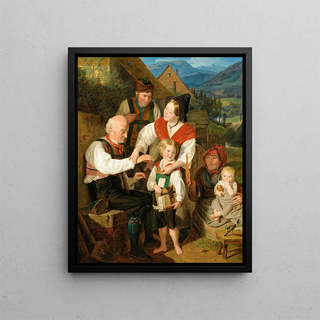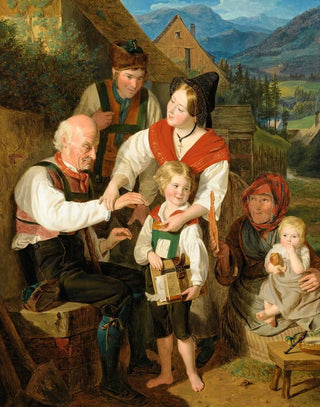Art print | The Rewarded Stagecoach - Ferdinand Georg Waldmüller


View from behind

Frame (optional)
In the rich and diverse landscape of art history, some works stand out for their ability to capture moments of everyday life while evoking deep emotions. "The Rewarded Postilion" by Ferdinand Georg Waldmüller is one of these iconic pieces that, through its naturalism and attention to detail, immerses us in an intimate and touching scene. This artwork, painted in the 19th century, depicts a simple yet meaningful human interaction: a woman offering a reward to a man, symbolizing effort and recognition. By contemplating this scene, the viewer is invited to reflect on themes of gratitude and humanity, timeless values that still resonate today.
Style and uniqueness of the work
The strength of "The Rewarded Postilion" lies in Waldmüller’s distinctive style, which combines striking realism with romantic sensitivity. The artist, a master of portraiture and genre scenes, uses soft colors and natural light to create a warm atmosphere. The characters are portrayed with finesse that reveals their inner emotions, while the bucolic background adds a sense of serenity to the composition. Meticulous details, from clothing to facial expressions, demonstrate a deep respect for daily life and human interactions. Waldmüller manages to transform an ordinary scene into a moment of great emotional intensity, inviting the viewer to immerse themselves in the universe he has created.
The artist and his influence
Ferdinand Georg Waldmüller, born in 1793 in Vienna, left a significant mark on Austrian art through his innovative approach to realism. Raised in an artistic environment, he was influenced by the great masters of painting, while developing a personal style that emphasized everyday life and human emotions. Waldmüller played a key role in the Biedermeier movement, which valued themes of domestic life and nature. His work has inspired many contemporary and later artists, and his influence is still felt in modern art. Celebrating the beauty of

Matte finish

View from behind

Frame (optional)
In the rich and diverse landscape of art history, some works stand out for their ability to capture moments of everyday life while evoking deep emotions. "The Rewarded Postilion" by Ferdinand Georg Waldmüller is one of these iconic pieces that, through its naturalism and attention to detail, immerses us in an intimate and touching scene. This artwork, painted in the 19th century, depicts a simple yet meaningful human interaction: a woman offering a reward to a man, symbolizing effort and recognition. By contemplating this scene, the viewer is invited to reflect on themes of gratitude and humanity, timeless values that still resonate today.
Style and uniqueness of the work
The strength of "The Rewarded Postilion" lies in Waldmüller’s distinctive style, which combines striking realism with romantic sensitivity. The artist, a master of portraiture and genre scenes, uses soft colors and natural light to create a warm atmosphere. The characters are portrayed with finesse that reveals their inner emotions, while the bucolic background adds a sense of serenity to the composition. Meticulous details, from clothing to facial expressions, demonstrate a deep respect for daily life and human interactions. Waldmüller manages to transform an ordinary scene into a moment of great emotional intensity, inviting the viewer to immerse themselves in the universe he has created.
The artist and his influence
Ferdinand Georg Waldmüller, born in 1793 in Vienna, left a significant mark on Austrian art through his innovative approach to realism. Raised in an artistic environment, he was influenced by the great masters of painting, while developing a personal style that emphasized everyday life and human emotions. Waldmüller played a key role in the Biedermeier movement, which valued themes of domestic life and nature. His work has inspired many contemporary and later artists, and his influence is still felt in modern art. Celebrating the beauty of






